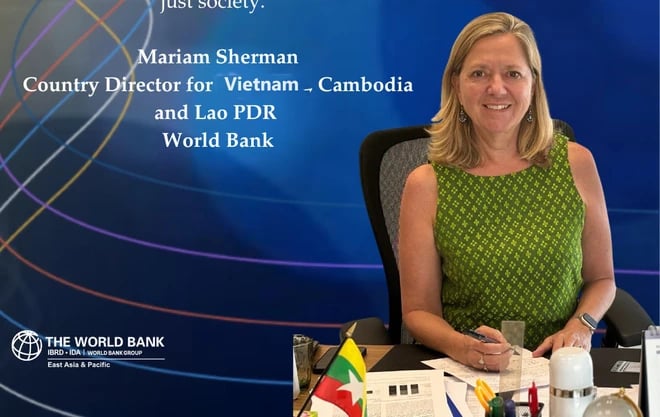November 27, 2025 | 05:09 GMT +7
November 27, 2025 | 05:09 GMT +7
Hotline: 0913.378.918
November 27, 2025 | 05:09 GMT +7
Hotline: 0913.378.918

Ms. Mariam Sherman joined the World Bank in 1997.
Ms. Mariam Sherman officially assumed the position of Country Director for Vietnam, Cambodia, and Lao PDR on May 1, 2024.
Ms. Sherman will oversee the World Bank's collaborations with the governments of Vietnam, Cambodia, Laos, and other development partners, as well as stakeholders from Hanoi base. Her role is to support activities that align with each country's priorities and the World Bank's vision to eradicate poverty in a livable world.
Ms. Sherman possesses three decades of experience. According to World Bank, the British leader has mastered essential leadership skills to bring impactful results in the region.
A British national, Ms. Sherman joined the World Bank in 1997 and has held diverse operational and leadership roles throughout her career across various regions including East Asia and Pacific, South Asia, the Middle East and North Africa, and Europe and Central Asia. Prior to her current appointment, Ms. Sherman served as the Country Director for Myanmar, Cambodia and Laos based in Yangon, Myanmar.
Ms. Carolyn Turk, who held the position before Sherman, has recently finished a tenure of over 4 years in Vietnam. Under Ms. Carolyn Turk's leadership as the World Bank Country Director in Vietnam, the institution facilitated Vietnam in promptly repaying loans obtained from the International Development Association (IDA). As a result, this aid supported Vietnam in its efforts to prevent COVID-19 and recover economically from the epidemic. Additionally, it provided non-refundable assistance to strengthen Vietnam's capacity for preventive healthcare.
Furthermore, between 2020 and 2024, the World Bank secured funding for extensive infrastructure initiatives, provided non-refundable assistance to Vietnam to reduce loan burdens, offered policy guidance, expanded governance, and improved the capabilities of central and local governments.
Based on the strong and enduring partnership of 30 years, the World Bank expects to continue supporting Vietnam's development and climate goals, including achieving the target of becoming a high-income country by 2045 and reaching net-zero emissions by 2050.
As of April 2024, the portfolio of active projects of the World Bank in the three Indochinese countries amounted to nearly USD 5 billion, with investments in various sectors including education, healthcare, energy, transportation, water, agriculture, urban development, digitization, and climate adaptation.
The World Bank also carries out strategic advising programs in Vietnam, Cambodia, and Laos to assist these nations in implementing crucial reforms in finance, economy, human capital, natural resource management, and climate action.
Translated by Linh Linh

(VAN) The Mekong River Commission adopts the 2026 - 2030 Strategic Plan with a people-centered approach.
/2025/11/26/1720-1-200855_132.jpg)
(VAN) Viet Nam and Japan have many conditions to expand cooperation on climate change adaptation, particularly in disaster risk management based on advanced technologies.

(VAN) The strong development of digital technology and artificial intelligence is opening up opportunities to transform science and technology into a 'Magic eye' for disaster forecasting and early warning.

Applying vaccines and proactive disease prevention helps pig herds stay healthy, maintain productivity, reduce risks, and decrease reliance on antibiotics in modern livestock farming.

(VAN) Many advanced agricultural technologies and products were shared at the Viet Nam - South Korea Agricultural Technology Introduction, Trade Promotion, and Connection Seminar 2025.

(VAN) Minister Tran Duc Thang hopes to strengthen connections and exchanges with China in agriculture and environment sector through the Embassy of Vietnam in Beijing.

(VAN) After 50 years of strategic cooperation, Viet Nam and UNICEF remain committed to promoting fair and inclusive development for all children in the digital future.